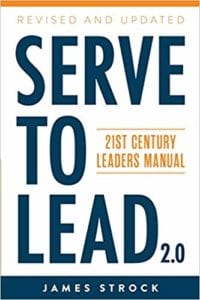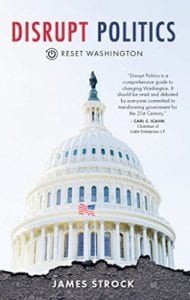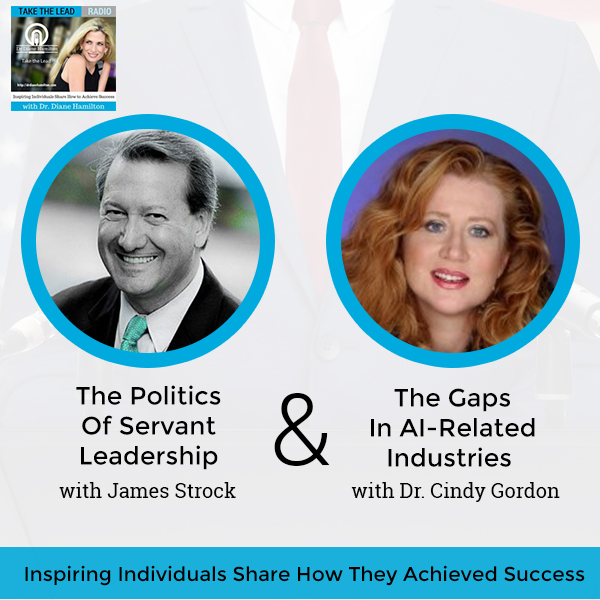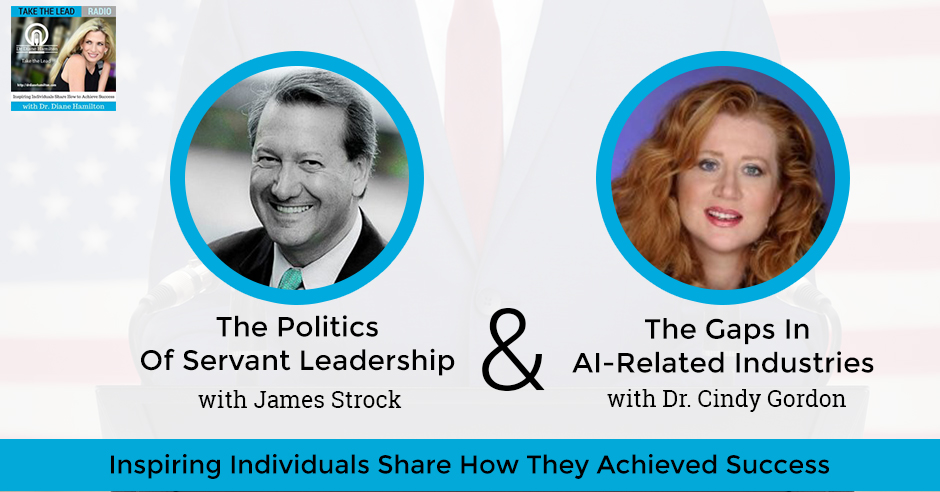We’ve got two smart people here and it’s going to be interesting in many different ways. James Strock is the Founder and CEO of Serve to Lead Group. He’s done about everything. He’s got a Harvard degree. He’s an interesting guy. I’m looking forward to chatting with him. Dr. Cindy Gordon is the CEO of SalesChoice, Inc. She is a Predictive Analytic Expert. She’s knowledgeable in innovation in different areas. We’re going to talk everything from politics to innovation. It’s going to be an unusual show with two of the brightest people.
Listen to the podcast here
The Politics Of Servant Leadership with James Strock

Serve to Lead: 21st Century Leaders Manual
I am here with James Strock who is the Founder and CEO of the Serve to Lead Group. James is a recognized authority and renowned speaker on 21st-century leadership, servant leadership and presidential leadership. He’s a bestselling author. He’s got a book titled Serve To Lead 2.0. It’s nice to have you here, James. Welcome.
It’s wonderful to be here with you. Thank you, Diane.
Looking at your bio is humbling. From Harvard to everything else you’ve done with being the Founding Secretary of the California EPA and Administrator for the US Environmental Protection Agency. There are many things. I don’t even know which things to pull out to talk to you about. It’s pretty impressive. You did a lot of writing about Reagan and leadership and different things. One of my first jobs was here in Scottsdale, Arizona. My boss said he was an advance man for Reagan, The Secret Service. I was at my office one day and the phone rang. It was the FBI asking me what I knew about him and if he was a good guy or not. I’d only worked there a month and I was eighteen. I was like, “I don’t know. He seems okay to me.” I know he did a lot of work with Reagan and you have a strong political background. Give me a little bio on you because I know I touched on some of the things that you’ve done but you have quite an impressive background. How did you get to this point?
We’re at the end of an election year, beginning of a new year time that is perhaps relevant in terms of political experience. I have worked a lot in it and I’m a political independent at this point. I put a lot of work into reforming the system with various groups in various ways. I’m part of the plurality in America who’s trying to do all we can to serve by helping reformat and if necessary, break up the party system. That’s in my non-work time. I do a whole lot of environmental and energy-type things, I’ve done that for a long time. I was blessed to happen to be a young person right when that field was starting, it wasn’t a field yet. That presented a lot of entrepreneurial opportunities that don’t come when a field is more established like they are now. I’ve certainly been committed to doing all I can to learn and to help share with others what I’ve learned about leadership in a practical way. My books are intended for people to use, not simply to observe or think theoretically but I try to write the books that I myself look for and have sought as I’ve taken on responsibilities and if they said I meet that, I feel I’m making a small contribution.
Servant leadership is a huge topic in a lot of classes I’ve taught. I’ve taught more than 1,000 business classes online and servant leadership’s probably in half of them. You write about things that my students need to learn about. You’ve been an adjunct here and in Germany but you don’t speak German.
It was simple courses as I speak rudimentary German. Fortunately, the incredibly well-educated and highly-motivated Germans that I was honored to serve in various capacities speaks English at least as well as I do. That’s humbling and a good reminder of something a lot of Americans and certainly I need to always work on and do a little better at. With that said, I thought I’d make one qualification to that. Sometimes Americans tend to be overly self-critical of our country on certain things where we shouldn’t be. While I think we need to learn other languages, the fact is that in those countries in Europe the entire countries are the size of little US states. They have the opportunity and the need to become proficient as children that we don’t tend to have. I’d give us a little bit of a break on that.
I was on a cruise and I was talking to somebody about how it would be nice to learn Italian. He said, “No, I wouldn’t learn that one.” I said, “Why?” He said, “That’s about the only place they speak it. It’s not like it’s everywhere. Spanish is more spread out in different languages.” You don’t think about that until somebody brings it to your attention. Since I have an Italian background, it was something I thought about. It is difficult to learn English. I have a lot of sympathy for people trying to do that. My daughter speaks four languages and I don’t know where she learned to do that.
Italian, being a romance language, you learn a bunch of languages in one. It’s like the romance of love. The other thing is I did take Latin for many years, which might seem like the ultimately impractical thing, but it is not. I use it all the time and not because I’m translating Latin anymore. God knows I’m not but it enables me to think about words and wordplay and etymology in ways that I could never have done without it. I’m incredibly grateful for it. Literally every day I use it.
That would have helped me when I was a pharmaceutical rep. You get all these terms and try and trace back and you go, “That makes sense now.” My husband is a doctor and he tends to think back to some of those types of things. You didn’t have time to learn any more if you’re going to Harvard Law School and everything else you were doing. I’d give you a break if you don’t speak fluent German. That’s pretty impressive what you’ve done. Tell me a little bit about your book and what you would hope to achieve from this book.
My book is a new edition. It’s a lot of redesign and a lot of listening to readers who have been kind enough to share ideas, questions and so on. It’s basically about how to understand all this crazy change we’re in leadership now. When I talk about leadership, we have all of our major institutions with perhaps one exception only. All of our major institutions in the United States are afflicted by a leadership crisis, even legitimacy crisis. Even from Pennsylvania Avenue in Washington, Wall Street in New York, the Catholic Church and we could go on. The exception in the public mind is the military and that’s a qualified exception. I wanted to look at what is leadership now and what you have to know. Much of what people look for and talk about came out of the post-World War II experience. They don’t think about it historically but a lot of our ideas on management and so on are post-World War II industrialized constructs and they fit less and less.
For people who are growing up, either older people who barely remember some of that are younger people who are coming of age in the early 21st century, they can feel they’re at sea because those assumptions aren’t there. What I was trying to do is lay out what’s different about the 21st century, how we live it and what can we do to serve and lead in these new circumstances. The book doesn’t presume to tell people, “Here’s what you ought to do.” What it tries to do is to lay out a way of thinking and to distill a tremendous amount of history and thinking from other people in various settings on a small series of questions. The fundamental one is to ask all the time as one goes about one’s life, “Who am I serving? Would I do something? When I talk to you, who am I serving? When I drive my car now, who am I serving? If I’m working on a project or giving a speech, who am I serving?” That’s basic stuff but you can pull up a lot from that basic route.
[bctt tweet=”Sometimes, we Americans tend to be overly self-critical of our country on certain things where we shouldn’t be.” username=””]I teach a lot of ethics-based classes where we get into Enron and all the scandals and what’s happening now. In a lot of the courses, we deal with generational change. You and I are both from the same Boomer generation so it was a little bit different back then. Is your book aimed more at the Boomers, Gen X, or is it all generations?
It’s all generations. There are things that hopefully are of value for all of them. One thing this book strives to do and the way it’s constructed is if you think historically and I don’t look at history as some vague amusement or some escape. I view it as a practical thing. I noticed in academics at major schools have discovered what they call applied history where you apply it. I’m thinking, “That’s all history is. That’s all I ever use it for is to apply it. Why else would you study it? It’s to get to the future. That’s the whole point of history and to see everything before now.” What it attempts to do is to lay out what our situation is. You take a bigger look and a lot of the things that are breaking down or we don’t feel are working right are industrial-age and post-World War II American constructs that were the unusual thing. What’s happening because of technology and all these new connections and so on is that the wisdom of more entrepreneurial times is relevant again, as Ralph Waldo Emerson in America. It opens up an entire range of influences and knowledge that can be useful now.
You’re interested in leadership and presidential leadership. I was lucky to spend another time with Steve Forbes watching him speak. I’ve asked him on many occasions, “Why would you do this? Why would you run for president?” He did a couple of times. What’s going on in the political parties? This show isn’t a political one but you have that background. I can’t tell you how many ads I saw with the election. It’s one person slamming the other person. All I saw was slamming. I don’t know what they stood for based on these ads, other than to do these damaging personal assaults. I don’t remember it being that way so much in the past. Do you think it’s getting worse? Breaking up the party system, what would you see instead?
One of the strong perspectives presented in Serve To Lead is how leadership and the stuff within leadership, like management, communication and how those things work is transferable and it cuts across areas. For example, the older generations now are used to this industrial age thing where everything is separate. We view political leadership and corporate leadership and NGOs are entrepreneurial as all being different. We get specialized. I think that’s wrong. The principles are the same, the applications are different. The principles are exactly the same and we’ve seen a tremendous bleeding across what used to be separate lines or lanes. Look at Mr. Trump, the President comes from business and it’s pretty seamlessly whether one likes him or not, he is clearly impactful and there are pros and cons to that.
Look at Bill Gates, who would have thought in the past, a person could go from an entrepreneurial and then conventional corporate setting to become such an effective NGO leader worldwide? The opportunities are much greater and people shouldn’t feel limitations, especially young people in my view, and be misdirected to think that they can’t apply the stuff in various areas. As to our politics, you’re living in Scottsdale. I don’t know your exact address but I know the area well and I know the political makeup of the various areas there. You probably are, depending on where you are, in a contested generally Republican area. I’m going to guess you got flooded with television and online negative ads from independent committees.
In one sense, in the Senate race we had which was close, the Democratic candidate outraised the Republican by a significant amount of money. Both of them had immense amounts of outside money coming in and almost all of these ads become negative in these kinds of races now. The action tends to depress the turnout or enthusiasm of your opponent while you raise yours as the parties continue to get smaller. For example in Arizona, there are now as many independents as Republicans and the Democrats are a somewhat distant third. You get in these negative vortex situations and it’s happening nationally too. Is it better or worse? It’s both. On the one hand, you can go to any history book or Google it and you will find Alexander Hamilton and Thomas Jefferson covertly hired newspapers to attack their opponents all the time. If you want to read the 1800 election, the attacks say on John Adams or Thomas Jefferson, they make now seem pretty tame, believe it or not.
On the other hand, what’s different is there was some lag time. Now with social media and so on and with the anonymity of it, you get this real situation where people can express themselves and they can find one another, other intense people and become little roving gangs in effect. They knock people over. We’re still starting to scratch the surface of how that affects the public. Having said all that, I’m not one of these people who’s negative about social media being properly regulated at all. People often say to me, “You’ve studied all these presidents and you’ve worked around some of both parties and so on. I bet you would be outraged or think Abraham Lincoln or Theodore Roosevelt would tweet or Winston Churchill.” I’m like, “No, you don’t get it.” I could see TR would be the best tweeter in history. He would be all over the social media. He was all over the media of his time.
If you look at our presidents who were the most consequential, one of the things they shared was they mastered the emerging technologies particularly in the communication of their times. Lincoln used broadsheets and he would get his speeches published in them so people could read the entire speech. One page in the Gettysburg Address was so short, but it was all going to be printed on the front page of broadsheets and it was so people could read the whole thing. It’s very brief. He had his work translated to German because German immigrants were a huge force. Many were not proficient in English at that point and he wanted to reach them. This was all novel at the time. Theodore Roosevelt was our first celebrity president. That’s before radio, before television, before life was even lit up. It’s dark outside and they had no social insurance. You can’t picture how much tougher it was.
Roosevelt mastered the new popular press at Pulitzer and all the tabloids that had begun to come out and then photography. We even had the first films of him and recordings of his speaking. Woodrow Wilson spoke beautifully. If you listen to him, he was from the South. Most people then sounded like their region very much in a way that now we don’t have extreme differences. Woodrow Wilson sounds like he could be on Diane’s show or moderating it or something. He sounds like a contemporary broadcaster. Except for what he’s saying but how he says it sure does. Franklin Roosevelt mastered the radio. That was a whole new thing in that way and also revolutionized presidential speechmaking. People forget this. Eisenhower inaugurated the televised presidency. Truman had the most minor foray into that and then John Kennedy took it to a much higher level, uniting Hollywood and Washington.
Ronald Reagan is particularly fascinating in this respect. If you think of his life, he’s born in 1911. He mastered a whole series of communications technologies. He was first a stage actor, then he’s a radio announcer. He becomes a movie actor and then a television actor. Most presidents, most people tend to be good at one kind of communication and not others because they don’t do it in a disciplined way or understand or it’s too much about themselves perhaps. For example, you’ll notice a lot of public figures who might be very good at a big public address but are not nearly as good as at the intimacy of a radio or a podcast. Reagan could do all those things and if you listen carefully, one can learn a lot because you observe how intentional it was.
It’s a long answer but it’s because of a lot of history here and there are a lot of positive things that we are in the midst of that can work out in a good way. Amidst all this stuff happening and all the chaos in many ways in our politics and so on, the opportunities for individuals to lead and serve have never ever been anywhere near what they are now. I’m not envious of anybody but I was speaking to a wonderful group of students in a graduate program in San Francisco. I had to say that while I don’t get envious of people, I’m a little envious of you because it’s unbelievable the vistas that you all had before. It truly is.
Technology is amazing what their opportunities are that we didn’t have. I find it very hopeful to look at that group as well. As part of what we were discussing, I’m curious about the breaking up of the party’s system. What do you hope would happen there?

Disrupt Politics: Reset Washington
I’ve written a book about it called Disrupt Politics. That’s an example of my trying to apply leadership principles myself and one of the things I’m involved with. We have ourselves in this peculiar situation. Take Arizona or take California, they’re both more or less dominated by one political party and it’s the different party at state. Republicans in Arizona and Democrats in California and they both have parallel dysfunctions that are severe. For example, you have basically corrupted institutions, corrupted elections processes. The parties know that in both these states, independents are the future and particularly look at young people. The partisans don’t want to hear this but it’s happening and you see it. There’s lots of evidence, it’s all over. Both parties are trying to do all sorts of things using, I would say abusing the legal process to make things more difficult for third parties and independent candidacies. It will protect the Republicans here.
We had a senate race where one of the two party candidates never mentioned she’s a Democrat at all. She said she’s independent, which ought to be a warning to a lot of people. That’s probably how Democrats can best run in this particular state or any state where your party is not the majority won. More importantly, it’s a reminder that she was smart and disciplined to realize that’s where the mother lode of people are or where they’re headed because they don’t feel represented by the legacy parties. The more they shrink, and you saw this in the elections, both of them say are ones in general that legacy parties are getting smaller and smaller. Nationwide, there are about 44% independent self-identifiers, around 28% are Democrats and Republicans. They go up and down like 1% back and forth but these are big numbers now. You see a lot of dysfunctions where the parties are getting more and more extreme because people are flooding out.
The fact they’re seeking new ways of looking at things and different clusters of issues, in the short term, that makes things appear worse. The politicians have to respond more and more to these small electorates they’ve got. They worry about Democratic or Republican primaries but it’s a transition to what’s going to be eventually a break up of an outdated system. It’s so much built into people’s experience. I’ve heard even people who incredibly learned about the Constitution say things that are incredibly wrong. I met one person, it’s a public forum and he gave a big talk about how great the parties were. He said, “The foundation of the Constitutions.” I said, “That’s a great point. What provision exactly are you referring to?” “There is not one. There’s none. The founders were a very much anti-political party.” People are totally wrong on this.
You wonder what goes down generation after generation. You heard and you start to think, “This is it.” I wrote a book that’s coming out about curiosity and what makes us curious and what holds us back from being curious. A lot of it is our assumptions and our environment on top of fear and technology. We base a lot of what we do on our assumptions from things from the past, what we’ve heard. We sometimes don’t even question it because it’s always been there and our environment of whom we’re around. All of this ties into what I’m interested in and what you do is fascinating. Would you run for president ever?
I’m not going to announce to run now but thank you so much.
I could see you as somebody that would be good for bringing people back to the middle. You’re great at telling a story where you can grasp what you mean and take in all this information. It always impresses me when people are good at knowing such a strong background and history and the importance of it, not memorizing dates. You bring it to life. I thought that it was fascinating to hear that, all that you shared with the show. A lot of people probably want to know how they can get your books and find out more about what you’re up to because you’re a fascinating guy. How can they get your book?
If they would be so kind as to go to ServeToLead.org, that’s my website. The books are on there and all kinds of stuff. You can get ahold of me if you’d like to. Tell me where to go or ask me what I need to tell you or whatever you need to get right through that.
Thank you so much, James. It’s been interesting. I’m glad you joined me.
Thank you. It’s an honor as well as a delight to be on your wonderful show.
You’re welcome.
The Gaps In AI-Related Industries with Dr. Cindy Gordon
I am here with Dr. Cindy Gordon who is the CEO of SalesChoice, Inc. She was the winner of the number one AI Disruptive Award in Canada for 2018. SalesChoice is an artificial intelligence, cognitive sciences and advanced analytics company. She’s the author of multiple books. I’m very excited to have her on the show. Welcome.
Thanks, Diane. I’m thrilled to be here too.
I’m fascinated by your background. First of all, I said you’re Dr. Cindy Gordon. What is your Doctorate in?
It was a long journey. Essentially, I focus on social network optimization and how you could drive growth. I specialize in innovation, looking very much at network optimization because everything now is ecosystem-centric and underpinning those in your business strategy is imperative for growth. I’m a geek by background. The additional context of flows to drive results in new ways is the known expertise that I have.
I love that you say you’re a geek. I could say that about me. It’s unusual sometimes for women to find some of these topics as appealing and you get a lot of attention to the gap of women in technology. How we’re not seeing as many going into some of these AI types of industries or STEM background. I teach for a technology school and almost everyone in my class is 95% male. It’s interesting to see a woman at the helm here of such an innovative company. Are you seeing that there’s a gap of women in your industry? What do you think is the future of that? Are we going to see more women?
I spoke at an international engineering conference on this topic. There are a couple of things that are happening in the market. If you go back many years ago, we had more women in science, technology, engineering and math than we do now. We’re averaging about 23% to 27% of most of the computing science and engineering faculties with women. There are a few exceptions but when you add up all the stats internationally, it’s not a rosy outlook. Why has the decline happened? There are three dynamics going on in the industry at large. One is the gap in income parity has become clear and exposed and rightfully so. Leaders like Salesforce.com with Marc Benioff has brought up a complete audit on gender equity for all pays. There’s not the discrimination in biases between men and women and what they’re offered upon intake, and even at the executive level. He’s leading the way and kudos to Marc for doing that comprehensive audit but exposing the audit gap of literally millions and doing the right thing. That’s one systemic issue.

Servant Leadership: Presidents who were the most consequential mastered the emerging technologies in the communication of their time.
The second systemic issue is in the sense of the overall adage on the variances between how men and women communicate which Barbara Annis has done a lot of research there on how we speak. Women don’t always feel they’re listened to within the tech sector and that’s the responsibility of leaders to step their game up. The third systemic issue is quite frankly inappropriate behavior in terms of approaching women in ways that aren’t appreciated. The #MeToo Movement is exposing that and the tech sector has a lot of cleanups. The reality is that to attract, develop and retain women in STEM, which is critical for the field of AI that I specialize in, it’s leadership governance accountability at the board, at the C-suite and also training.
There’s no reason for us not to get this right. I’m encouraged by leaders like Salesforce. Adobe and other companies are stepping up. McKinsey finished a report believing that we should be able to get the gender parity in the intake and on some of these issues in about fifteen to twenty years. From my perspective that too long because the speed of AI requires more women in the design the development to ensure there’s no bias in the data sets. That’s some big ethical AI issue that’s very key in the industry. It’s a loaded topic but the facts are there. It’s all a leadership responsibility to get this right.
It’s interesting to see that there are some people who naturally gravitate towards certain jobs and interests. You’re not the typical person that I meet that does go into this high-STEM, high-innovative job for women. What made you different than women who don’t go that way? Were there some factors when you were young? Did your family have this as something that they were interested in or were you naturally a curious child? I would like to know more about your background.
I grew up in an entrepreneurial family. I have always been a curiosity cat naturally. I’d like to always look around the edges and I see patterns holistically. We all know brains are hardwired a little bit differently. I’ve got a trajectory on the right brain hemisphere that’s off the charts in terms of innovation and curiosity. You’d hit it right on. Not everybody is made up in the same way. If you’re in a deep light left brain-centric person, you only see things within a certain sphere. We all have different mental models as you know. What is important as an executive is to have incredible diversity in thought and in perspective. I honestly think there’s an area. Maybe it’s a gap in the whole recruiting industry and looking at the brain dimensions of the people to make sure that you do have enough variance. The colors in the tapestry are very web-centric. I don’t mean web in the literal sense of the web or the internet, I mean in terms of possibilities. What you bet on and who you bet on with, if you don’t look at the edge plays, you can’t see disruptive innovation or you can’t see a breakthrough.
[bctt tweet=”The opportunities are much greater and people shouldn’t feel limitations, especially young people.” username=””]If you look at most of the C-suites, they’re not trained on some of these aspects. Deloitte finished a study in Canada that you may or may not be aware of. They’re looking at the top C-suite here saying, “What’s the number one gap in the skills on innovation for top leaders in Canada?” In our case, the number one was a lack of courage. I interpret courage as often curiosity to take risks, to go beyond what’s possible. I came back from travel in Asia. What I observed there was the incredible sensitivity to waste. It’s so clean in South Korea. They’ve done an incredible job in waste management and the sensitivity as well to technology being pushed in ways that are incredible. The selfies are drones. I saw an experience at the Samsung Future Electronics Lab. There’s an intelligent smart stove where it had facial recognition where it said, “Hi,” and it looked at the fridge as well advising because the voice recognition, which is facial recognition technology, alerted the smart fridge saying there’s a ham. You build these use cases and then an automatic recipe came up and advised me on what’s in my fridge, so that diagnostic sensor technology.
They’re pushing the edge in innovation and creating new ways of working under the subway system for people that are blind, incredible sensitivity. I hold on the rail and it’s all Braille underneath every single railing. You see they’re making a strategic call to say, “We’re going to be the best in the world,” and you saw that in Japan and South Korea where mainly I was spending my time. Getting back to the subject, linking back to your point on STEM, women are incredibly creative people. There are less than 2% of women, which might be 1% of 1.3%, in the AI field studying to be an AI specialist. Whether it’s the designer architect, whether it’s envisioning and building the technology and understanding the different modalities you could play to build different solutions sets.
We have a real issue. In Canada, we’ve declared we want to be supercluster in AI and an international leader. We are one of the top three in the world, but to maintain that position is going to be very much challenged. China’s number one, US is number two. It’s not a surprise that Canada is number three but can we hold our own? Not if you look at the university ratios. The only way we could hold our own is constant immigration and the experience of this fear now with the war of talent in the space. That’s why you see these astronomic income levels for a PhD coming out of Stanford, maybe having one-year work experience going to Google with $1 million base entry. We are into a crazy talent gap on innovation and stretched that I’ve never seen in my lifetime. I call this the tsunami of all tsunamis. Give me an industry and I’ll tell you what it’s going to look like, that’s a curious cat. Not everybody is ready for that, but the China plan for AI is worth reading. It’s on our AI Directory, it’s a not for profit I founded. It’s worth reading. What they said is that every single industry from the ground up will be AI-enabled.

Servant Leadership: Courage is often the curiosity to take risks, to go beyond what’s possible.
You brought up so many points when you talked about the courage to take risks. That tied in well to the research I did on curiosity. There were four things that hold people back, and fear was number one. Fear, assumptions, technology and environment were the big factors that are holding people back. You’re talking about all these innovations and what you saw. We saw futuristic movies in the past. I remember seeing Arnold Schwarzenegger in The 6th Day where the refrigerator told him to get milk. These things are happening now. AI is such a hot topic. I know you deal with it in so many realms. I worked in sales for decades and salespeople are going to be dealing with artificial intelligence as it becomes more pervasive. What do you envision the future is going to be for those sales professionals as AI progresses?
This is what’s happening. A lot of the investment in the whole CRM, customer relationship management space and AI-enablement has gone pretty significantly in the marketing rate. The reality is the customer inflection point on purchasing and loyalty have really changed dynamics. In many ways, the prior world of being able to get someone on the phone or an email and a response, that whole world is almost dead. It’s finding the right buyer at the right moment in time with the right message and knowing in advance is where AI can play a major role.
Marketing has done a lot on that upfront. Here’s the dilemma. We have a huge privacy issue. As usual, technology’s upfront legal regulation, security frameworks are lagging. We will be faced with these regulatory accords, and they’re not the US and they’re not in Canada yet. I’d say the UK is leading here with their GDPR frameworks, but the inspection processes aren’t there. Consumers or customers, things like in sales world where I’m on a sales call from a former Xerox gal. I’m talking to Diane. I know Diane did her Doctorate. I know that she specialized in curiosity innovation. I know that she knows her emotional intelligence level is vivacious, high energy, positive. She will connect best with people that are of this personality profile with this value set. It’s like me going into a room with a bunch of really deep tax people that can only talk in numbers all day long and my brain is like, “Get me out of here. Let me go have some fun.” Not to say there’s no value in those kinds of skills but the connectivity of the energy flow because I’m a big believer in physics, and energy creates connections.
Getting back to the AI piece and the question of sales, the biggest issue is finding the right customer at the right time. Marketing has been purchasing all kinds of solution sets. We put here a solution called Growbots. We looked at both of those companies that are scraping the worldwide web and then surfacing goes right factors and then adding cycle graphic overlays. Let’s get the sales. Sales rely traditionally on marketing people to send the right leads to them. They can qualify and act, hopefully, convert and be compensated and then it moves to customer service operations. For the harvesting and making sure that everything works as promised or hopefully as promised.
On the sales side, this is the big gap that we have. First of all, we don’t have any university programs for sales professionals so let’s be clear on that point. In marketing, we do. There are big gaps. What happens in the sales side is that we’ve built over the last many years of sales professionals. They have to rely on either the companies scaling them up into a particular methodology in the process or go to sale professional associations and get some accreditation. The rigor and my point and consistency across that professional base is a mess. What happens there is most programs don’t typically train for analytical, skill competencies and math. We have an entire generation of people in sales worldwide that are much stronger on emotional intelligence. Relationship management, connecting with people, having a conversation and still the gap on the strategic front. If I take the whole industry, I would say there’s a gap there.
What’s the impact there for AI? One, we have a catastrophic situation of the profiles of people in sales with AIs because they are not analytically-inclined. They’re not as curious. They’re not as willing to experiment on innovation. One of two things will happen. B2B sales productivity is at the world’s worst low of all lows worldwide. We’ve had about 33% productivity in the field focused on what’s important. What people don’t know and you’ll appreciate that the human attention span cognitively has dropped like a rocket since the advent of mobile. We’re down to cognitive skill set 50% less. I want to say intelligence but I won’t, our ability to focus in the last many years. Then you add in the sales persona, 30% of that population has attention deficit disorder and we do nothing about it.
30% to 60% of those sales professionals interestingly enough in the middle tier don’t make their targets. You add up all the patterns and you say, “What’s happening?” We have a distracted economy worldwide. We know that. We have the wrong skill sets and development in sales on large, yet we keep pushing the same paradigm, “Do this. Do this.” The reality is two things are going to happen. One, the cobots will win with one scenario where we won’t need any B2B sales professionals anymore. We won’t need the warm-up crowd. We may not even need the marketing crowd to be pretty candid. We will need the closers and we’ll need the harvesters.
We’re in a situation I personally believe and what our company has done is we saw practical use cases. The salespeople’s number one job is to make their plan, but with all the complexities and anomalies especially in mid to large companies with a lot of volumes, they can’t be accurate like advanced AI can. We can predict the future here many months in advance before you even get there. That gives you a lot of maneuverability on the data patterns. We’re getting into levels of 95%. One client, we’ve got 98% accurate on predicting the future twelve months before.

Servant Leadership: AI is only as smart as the data it collects and the modeling attributions.
What exactly are you predicting in the future?
Financial forecasting, whether they’re going to make their numbers or not and what’s happening through a variety of data insights and whether it’s the market or what’s happening. Sales forecasting will totally be driven by AI in the future. The other piece that we’ve learned here is that the guided selling with AI is powerful, “Do this, do that, turn right, turn left.” I don’t want to say that we’ve dumbed down our salespeople, but the reality is that they aren’t productive, let’s be clear on that point in B2B. The new generations, they’re comfortable working with Uber. They can see where I’m going. That’s the world we’re in right now and the solution sets in the world that I’m in and the companies that start to embrace these solutions are going to win.
They’ve got to be careful that they’re not buying black box vendors because when the laws shift and they will. They will be clear on things like, “If I have in my contact database a note on Diane and I don’t have Diane’s permission to record that field, I could be legally sued because I did not have your permission.” Everything we record in infrastructure, annotation would probably require your approval because AI is only as smart as the data it collects and the modeling attributions. I would call it an explodable area on black box AI methods versus explainable AI and the efficacies of the data sets and whether or not they are gender reflective of even where the company wants to go.
There’s going to be a huge future for philosophy people and social skills as well in this area because they will be naturally curious to try and get this right. It’s an interesting time. You could close your eyes and think, “What was it like when I was in a horse and buggy and I all of a sudden heard the noise of a train, let alone a plane?” Now we’re faced with a tsunami that will underpin everything. Every object in our house will have an AI sensor and who is going to own that data? I was looking at some recent research. This one’s a little bit scary and it’s true that I get a random call. It listens to my voice, you get those rovers. I say, “Hello, Cindy.” It records my voice and then basically an AI agent extrapolates that into a complete conversation string and then calls your child, “It’s mom.”
These technologies are there. They’re in the market. The scary part is that voice recognition is getting precise by AI agents that we cannot detect it’s not Cindy at all. Cybersecurity warfare in this area is unprecedented. You don’t know how to combat it at all yet. It’s a loaded area. For the salespeople, it’s a big issue. The universities worldwide need to wake up and start putting in the programs. Marketing and sales should be mashed together. I don’t think anybody should be in marketing if they haven’t been in sales. I’m saying that sincerely because we constantly have the strain between those two lines and it’s logical. How do you build credibility if you’ve never sold? It’s like being a surgeon. How do I build credibility if I’m the surgeon and on the other side I’m being told what to do and who to talk to or how to operate? Lots of dumb things are happening that smart people know how to fix. It’s hard to get a momentum going to get this right. I wish I could point to a few university programs. I’m on the prowl all the time that is building out a professional accreditation for sales integrated with marketing. I haven’t found one.
[bctt tweet=”We base a lot of what we do on our assumptions from things from the past.” username=””]I know a lot of universities and I used to be the MBA Program Chair at one. I know that there are a lot of people that are trying to find the future of education. You have a lot to offer for insight and this has all been fascinating to me because this is all my background, sales and marketing and teaching all of this type of thing and innovation is everything I’ve been focusing on. I have enjoyed our conversation. Many people want to be able to research you and find out more about what you’re doing. Is there any link you’d like to share or information?
It’s two things. One is going to www.SalesChoice.com and you can certainly see the different products and solution sets that we offer from predictive sales forecasting, guided selling, and also predictive sales analytics. The other thing is that who’s who in the AI community and if you are in the AI community, I encourage you to go to AIDirectory.ai. What we’re trying to do there, and that’s a not for profit movement, is identify all the players globally that are in AI that are doing applied AI. Lots of research is underway in the field but exposing the companies that are getting AI right is important from the ground up. There are only about 13% of companies that have an AI strategy in North America. You take the mid, small business, mid to large, it’s about 17% that have a comprehensive strategy.
There are a lot of politics going on as who should own AI as a strategy. IT professionals are saying, “That’s me.” I don’t think that’s the right answer but we can save that for another day. Those are the two areas. I’m delighted to be on your program. I do look forward to talking to you sincerely about the educational gaps. Maybe there’s something we can cook up there. It’s a serious issue and it’s a serious issue in attracting women into these fields. I lead Canada for Women in STEM as well. I’m the National Spokesperson on this topic. Feeding government-related things to do but also within our broader Canadian Advanced Technology Association community, which is in Canada the leading tech association for advancing thinking in STEM as it relates to women in tech.
I appreciate having you on the show. It was nice of you to share all this unusual what’s going on in the market with AI information because a lot of people get confused by it. Thank you so much.
Thanks so much, Diane, for having me on your show.
You’re welcome.
—
I’d like to thank James and Cindy. What great guests. They’re two of the brightest minds. I hope you join us for the next episode of Take The Lead Radio.
Important Links:
- Serve to Lead Group
- Serve To Lead 2.0
- Disrupt Politics
- ServeToLead.org
- Serve To Lead books
- SalesChoice, Inc
- Salesforce.com
- #MeToo Movement
- www.SalesChoice.com
- AIDirectory.ai
About James Strock
James Strock is the Founder and CEO of Serve to Lead Group. James Strock is a recognized authority and renowned speaker on 21st century leadership, servant leadership, and presidential leadership. James is a bestselling author. His books include: Serve to Lead: 21st Century Leaders Manual; Disrupt Politics: Reset Washington; Theodore Roosevelt on Leadership: Executive Lessons from the Bully Pulpit; and Reagan on Leadership: Executive Lessons from the Great Communicator.
About Dr. Cindy Gordon






0 Comments